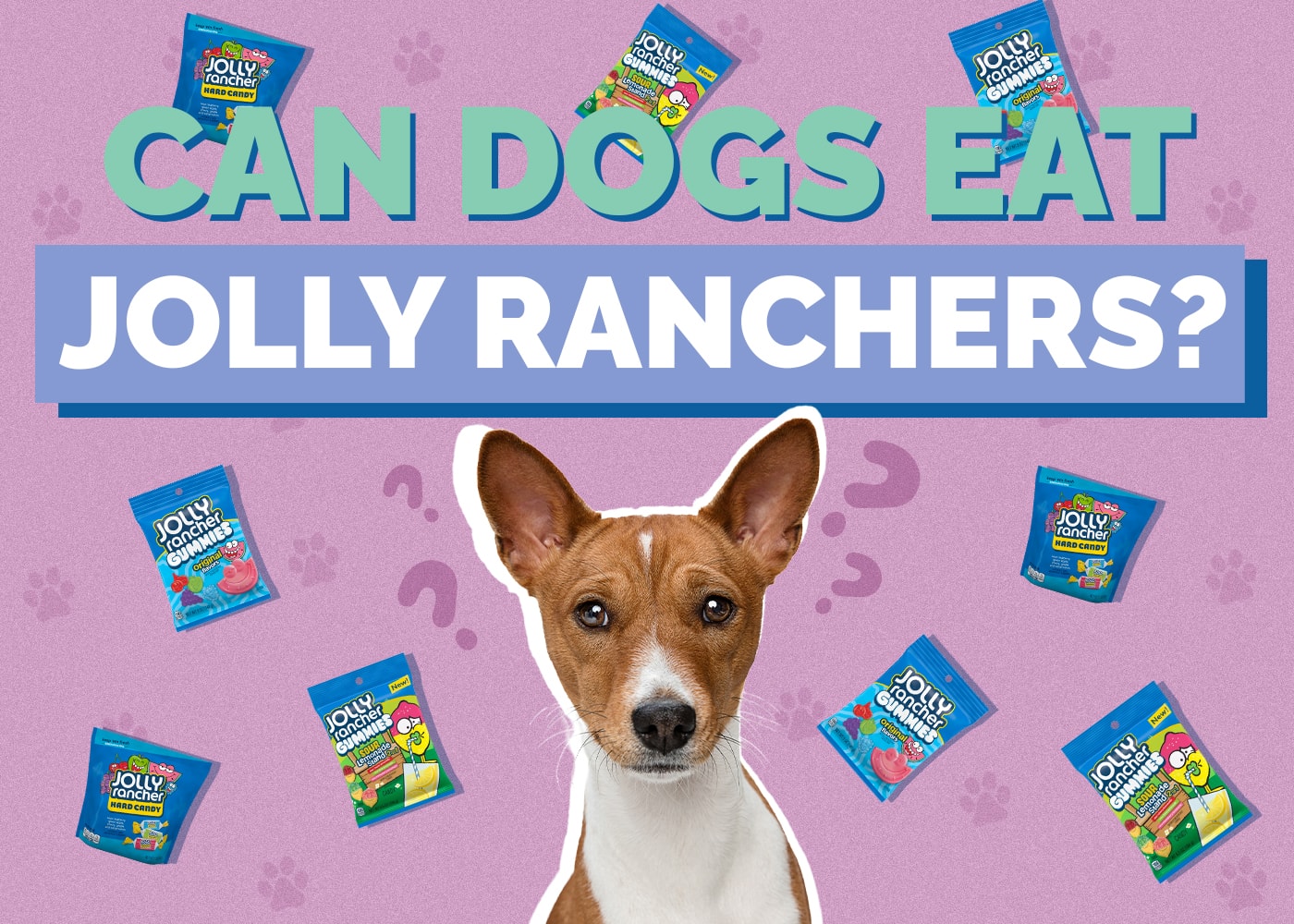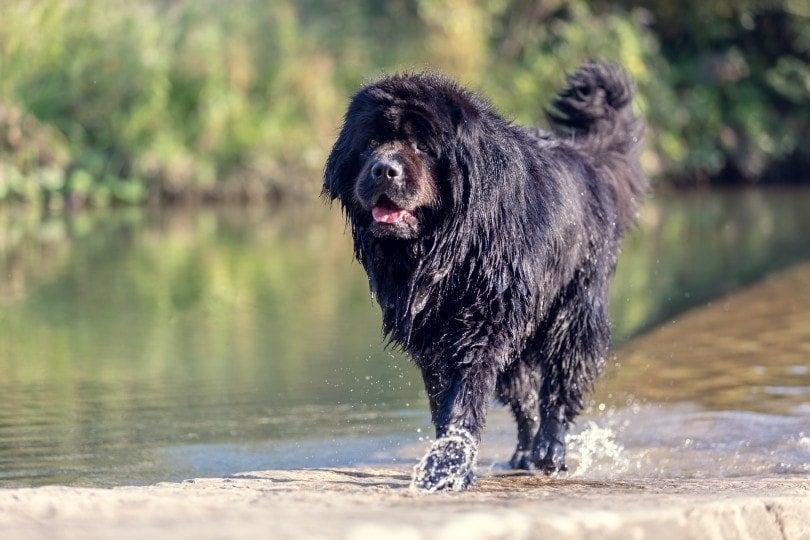Can Dogs Eat Jolly Ranchers? Vet-Approved Health & Safety Guide
Updated on

If there’s a holiday with lots of candy around, or you simply just have some candy in your home, it’s always possible for your dog to get into it. Lots of candies are toxic to dogs, so you need to know what to look out for.
Jolly Ranchers are a popular hard candy, and it’s fairly likely that your dog will eat them if you leave them out.
Jolly Ranchers are not necessarily toxic to your dog but are unhealthy and can cause problems, so dogs should not eat them. Jolly Ranchers are hard candies, so that is a no-go already. There are many health concerns that come with your dog ingesting hard candy.
While Jolly Ranchers may be technically okay in small quantities, it’s still important to make sure your candy is somewhere that your dog cannot reach. They are not a healthy treat for your dog.
Risks of Feeding Dogs Jolly Ranchers
Jolly Ranchers are a hard candy, meaning there are many risks when your dog ingests it. As well as being a choking risk, if your dog eats too many, it can clump up in your dog’s stomach and cause a whole lot of problems to their digestive tract.
Wrappers, as well, may cause problems. They may pass through the digestive tract but can sometimes get stuck and cause serious obstructions of the bowel, meaning that surgery is needed to remove them.
Jolly Ranchers also have quite a bit of sugar in them, and that can cause stomach aches, nausea, vomiting and diarrhea. If eaten regularly too much sugar in the long term can lead to weight gain and obesity.
Are Sugar-Free Jolly Ranchers Better?
Sugar-free Jolly Ranchers really aren’t much better. Luckily, unlike many sugar-free candies, they do not contain xylitol, a very common artificial sweetener that is toxic to dogs and many other pets.
Xylitol, when ingested in dogs, can mess with blood sugar, causing a host of issues. Xylitol is quick to be ingested and absorbed into your dog’s bloodstream, meaning you have to act fast if your dog eats any.
This absorption causes insulin to be sent out from your dog’s body without any actual sugar helping stop their blood sugar from dropping dramatically. This causes hypoglycemia, which can occur within just 10–60 minutes of ingestion.
This substance can also cause seizures, liver failure, or even death when ingested by your dog.
What Human Sweets Are Toxic to Dogs?
Many human sweets are toxic to dogs, so it’s important to be on the lookout and keep any unsafe sweets away from your dog. Anything containing chocolate is a possible issue as theobromine, found in chocolate, is toxic to dogs in large amounts.
Ingestion of too much chocolate per the dog’s body weight can cause chocolate toxicity, which has symptoms such as tremors, vomiting, diarrhea, hyperactivity, seizures, and even death in some situations. Dark chocolate is the most dangerous as it has a higher theobromine concentration.
Chocolate is very common in sweets, being found in candy from Twix to Reese’s to M&Ms. It’s important to watch out for these sweets as they can be incredibly harmful to your dog.
Most bubble gum contains xylitol, meaning any kind of gum can be dangerous for your dog. Raisins are also dangerous, as they are toxic to dogs.
What Sweets Can Dogs Eat?

There are a lot of better alternatives to candy when it comes to your dog. Anything including peanut butter without any of the toxic additives mentioned above is safe for your dog in moderation. Dogs tend to love anything with peanut butter, so you can easily make dog-safe peanut butter bars, cookies, cakes, or biscuits. There are plenty of recipes online for safe dog treats.
Another great alternative to candy is pumpkin-flavored desserts. As long as they’re considered dog-safe and don’t have any toxic ingredients, pumpkin is actually fairly healthy for your dog.
Fruit popsicles (excluding grapes) are generally safe for dogs as long as they are in moderation, as they can be pretty sugar-heavy. Homemade popsicles without sugar can be made easily with water and mashed fruits such as blueberries, strawberries, bananas, raspberries, and pretty much any dog-safe fruit.
Certain types of plain yogurt in small amounts is another safe alternative to candy. It includes many nutrients that are great for your dog, and you can even add toppings like berries or other fruits. Sweet potatoes are also pretty healthy for dogs, so you could make many, many treats out of them.
My Dog Ate Candy, What Do I Do?
If your dog eats candy, the first thing you need to do is try to get the wrapper from them. One, because it’s dangerous for them to eat, and two, you need to be able to see what it was in order to tell if it’s toxic or not. Look for anything containing xylitol, an artificial sweetener. If it does contain it, take your dog to the vet immediately. It can be life-threatening. If not, you need to look at the other ingredients to see if your dog needs to go to the vet.
If you have a bigger dog it may be ok if they eat a small amount of candy or chocolate. Monitor them closely and contact your vet if you have any concerns.
As for small dog owners, you need to be much more careful, as smaller amounts of ingredients such as chocolate can cause issues.
Diarrhea and vomiting are the most common problems after eating high-sugar candy. Always contact your vet if you have any concerns about what your dog has eaten or any signs they are showing.
Conclusion
There are many holidays where sweets are common, or you may just often have candy around your house. It’s important to keep all kinds of candy away from your dog just in case they get into it.
While Jolly Ranchers are not necessarily life-threatening to your dog, they can still be dangerous in large quantities. It’s not recommended that you share your Jolly Ranchers, but your dog likely won’t die if they sneak one or two.
See Also:
Featured Image Credit: Jolly rancher gummies (ᐃᓄᒃᑎᑐᑦ via Wikimedia Commons, CC0)














